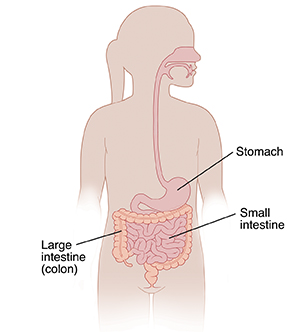A
B
C
D
E
F
G
H
I
J
K
L
M
N
O
P
Q
R
S
T
U
V
W
X
Y
Z
Topic IndexLibrary Index
Click a letter to see a list of conditions beginning with that letter.
Click 'Topic Index' to return to the index for the current topic.
Click 'Library Index' to return to the listing of all topics.
When Your Child Has Irritable Bowel Syndrome
Irritable bowel syndrome (IBS) is a relatively common condition in children. It affects your child’s digestive tract. This is where food is broken down to give your child energy and to help him or her grow. No one knows exactly what causes IBS. It may be a result of the nerves in the intestine being overly sensitive, causing spasm and changes in the way the intestine contracts. IBS may come and go, but there are things you can do to help your child feel better.

What causes IBS?
The exact cause of IBS is not known. It may have many different causes. But it may involve the nerves and muscle movement that passes food and liquids through the digestive tract. If food passes too quickly, the colon can’t absorb enough water. This can cause painful cramping and watery stools (diarrhea). If food passes too slowly, too much water is absorbed. This can make the stool dry and hard (constipation).
What are IBS symptoms?
Symptoms of IBS can vary from child to child. IBS is a change in how often the child poops and the form of the stool. It could be too loose or too hard. IBS also causes belly (abdominal) pain or cramps. Common symptoms include:
-
Painful cramps
-
Gas
-
Bloating
-
Diarrhea
-
Constipation
How is IBS diagnosed?
To diagnose IBS, the healthcare provider will start by asking about your child’s health history. The healthcare provider will do a physical exam. They may also order some tests to rule out other digestive problems. These may include blood tests, stool tests, radiology tests, and possibly endoscopy. For endoscopy, the healthcare provider uses a flexible tube with a small camera and light in it. The provider puts the tube (catheter) through either the mouth or anus to look at the inside of the intestine.
How is IBS treated?
There is no cure for IBS. But your child’s symptoms can be managed. The healthcare provider might prescribe medicine for symptoms such as diarrhea and constipation. There are also things you and your child can do at home to manage IBS:
-
Help your child not have foods or drinks that seem to make symptoms worse. Certain foods may irritate your child’s digestive tract. These foods can be different for each child. Write down what your child is eating and drinking and what symptoms happen. Use this list as a guideline to help your child stay away from irritating foods.
-
Make sure your child drinks plenty of water. Ask the healthcare provider how much water your child should drink each day. If your child is having IBS symptoms, limit drinks with caffeine and carbonation.
-
Have your child eat more fiber, if told to by the healthcare provider. Fiber is found in many plant foods. It helps stool keep enough water so that it passes more easily through the colon. Your child can get more fiber through food or prescribed fiber supplements.
-
Have your child eat small meals. If eating triggers your child's symptoms, frequent small meals may be helpful.
-
Help your child reduce stress and anxiety. While stress itself may not cause IBS, it can make symptoms feel worse. Help your child figure out the sources of stress. Talk with your child about ways to handle stressful situations. A counselor or therapist can teach your child ways to manage stress, such as a variety of relaxation methods.
-
Encourage physical activity. Physical activity is a great way to ease stress. It may even help ease constipation and other IBS symptoms. So encourage your child to play and be active every day.
When to call the healthcare provider
Even if your child’s symptoms are under control, contact the healthcare provider if you notice:
-
Weight loss
-
Blood in your child’s stool
-
Vomiting
-
Fever over 100.4°F ( 38.0°C) or higher, or as directed by your healthcare provider
-
Fear of using the toilet, at home or at school
-
Withdrawal from friends and family or prolonged sadness. These could be signs of depression.
Online Medical Reviewer:
Dan Brennan MD
Online Medical Reviewer:
Jen Lehrer MD
Online Medical Reviewer:
Tara Novick BSN MSN
Date Last Reviewed:
12/1/2022
© 2000-2025 The StayWell Company, LLC. All rights reserved. This information is not intended as a substitute for professional medical care. Always follow your healthcare professional's instructions.